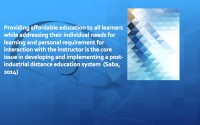Social Software and Educational Technology: Informal, Formal and Technical Values
Social software is a growing reality worldwide and several authors are discussing its use to promote social interaction in learning contexts. Although problems regarding privacy, reputation, and identity are commonly reported in social software, an explicit concern regarding peoples’ values is not a common practice in its design and adoption, in part, due to the […]








